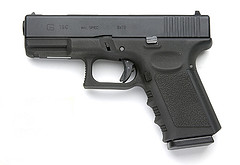Fake guns, real bullets
Article published: Monday, May 19th 2008
Gun crime has been a problem in Manchester since the 1980s. White men in suits are always quick to point the finger elsewhere, but how culpable are the squeaky clean business class? David Armstrong investigates…
 When pundits and politicians discuss gun crime in Manchester, they talk about gang culture, drug dealers, respect, race and community cohesion. It is true that all of these are important problems, the effects of which are probably far more serious than gun crime itself, which made up less than two per cent of violent crime last year in Manchester. We live in a city where, comfortingly, you remain far more likely to be stabbed than shot.
When pundits and politicians discuss gun crime in Manchester, they talk about gang culture, drug dealers, respect, race and community cohesion. It is true that all of these are important problems, the effects of which are probably far more serious than gun crime itself, which made up less than two per cent of violent crime last year in Manchester. We live in a city where, comfortingly, you remain far more likely to be stabbed than shot.
Strangely, though, short of the odd gun amnesty, the guns themselves are often invisible in these discussions. But guns don’t grow on allotments, even in Longsight. Like any other part of the global arms trade, Manchester’s guns are designed somewhere, made somewhere, sold somewhere. How they get to a shooting on Lloyd Street South is an international story that involves individuals, companies and markets.
Ironically, Moss Side is home to communities forced abroad by conflicts in places such as Somalia, Sudan and the Congo, where, notoriously, children fight with weapons supplied by shady European arms dealers. Moss Side’s arms trade is smaller in scale, but looks surprisingly familiar: rich European men making and buying guns abroad (all above board, of course) and selling them to kids from poor communities, for profit.
It goes like this. After the Dunblane massacre, selling handguns to civilians in Britain, or possessing them, was effectively banned. As a result, buying an (illegal) real handgun is probably prohibitively expensive for even the most well-connected teenager. Most of the guns seized in Manchester since 2003 have instead been converted or reactivated guns. Almost half are not real handguns at all, but replica gas guns. These originally used air or compressed gas to fire blanks, self-protection pepper cartridges, or pellets for shooting targets or work colleagues (in the peculiar simulated combat sport of Airsoft).
Unlike sports day starting pistols, though, these gas guns are lovingly crafted to look and feel exactly like famous real guns. This strange market owes much to the gun industry’s own elaborate pornography. None of gas guns legitimate uses (target shooting, fending off muggers and glorified paint-balling) actually requires such a precisely realistic replica firearm. They are essentially boys’ toys, designed for buyers who want to imagine that the replica gun in their hands is in fact the Glock pistol or Smith & Wesson revolver in their favourite Hollywood gunfest.
And conveniently, since they are such precise, highly engineered copies of real guns, they can be converted to fire real bullets with extraordinary ease. All you need do is drill through an obstruction in the barrel, and fit a metal sleeve to change the calibre.
The market in these conversion-suitable weapons is dominated by a small number of manufacturers. Greater Manchester Police told the European Parliament in 2006 that just six firms in Germany, Italy and Russia produced the bulk of the subsequently converted replica firearms seized by UK police.
Several of these manufacturers have been aware for years that their guns are incredibly easy to convert, and widely used in murders and shootings. A well-publicised 2002 study by the National Criminal Intelligence Service revealed that over 35 per cent of all firearms recovered by British police were a single model of gas gun: the ME38 Magnum, a replica Smith & Wesson revolver designed by German manufacturer Cuno Melcher, specifically for British distributor Brocock Ltd, according to Brocock’s owners.
Although Brocock stopped buying ME38s in late 2002, Cuno Melcher continues to make and sell them for export. When in April last year Gorton teenager Kasha Peniston accidentally killed his 12-year old sister with his mother’s gun, it was a converted ME38 that had found its way into his hands. Cuno Melcher sold 274 of them directly and lawfully to a 51 year-old white Gorton businessman, Robert Tyrer, who posted them from Germany to Manchester, where an engineer at an enterprising Ancoats engineering firm, DMC Engineering, drilled them illegally into working firearms and sold them across the city.
To be fair, Manchester police do care about these fake fake guns. They made much of their stern visit to the Cuno Melcher factory in late 2006. And some loopholes are being closed. Last year the Violent Crime Reduction Act at last made it illegal to make, import or sell realistic imitation firearms.
Thanks to sustained, quiet work by European parliamentarians (including North West MEP Arlene McCarthy) a Europe-wide directive was amended in November to count convertible firearms as guns whose possession and movement around Europe should be controlled and traced just like real guns.
And when MULE contacted Cuno Melcher in March to inquire whether a Fallowfield sporting gun dealership might be able to get hold of some ME38s, we received the tart but creditably correct response that their guns were now illegal in the UK.
But pipelines for convertible guns are opening up elsewhere in Europe: Italy, Lithuania, and other countries easily reached on a budget flight from Manchester Airport, where they remain cheap and legal to buy.
The individuals and companies may change, but it looks likely that wealthy western men will still be making, buying and selling the guns used in the least wealthy communities in Manchester for some time to come.
More: Manchester
Comments
No comments found
The comments are closed.



